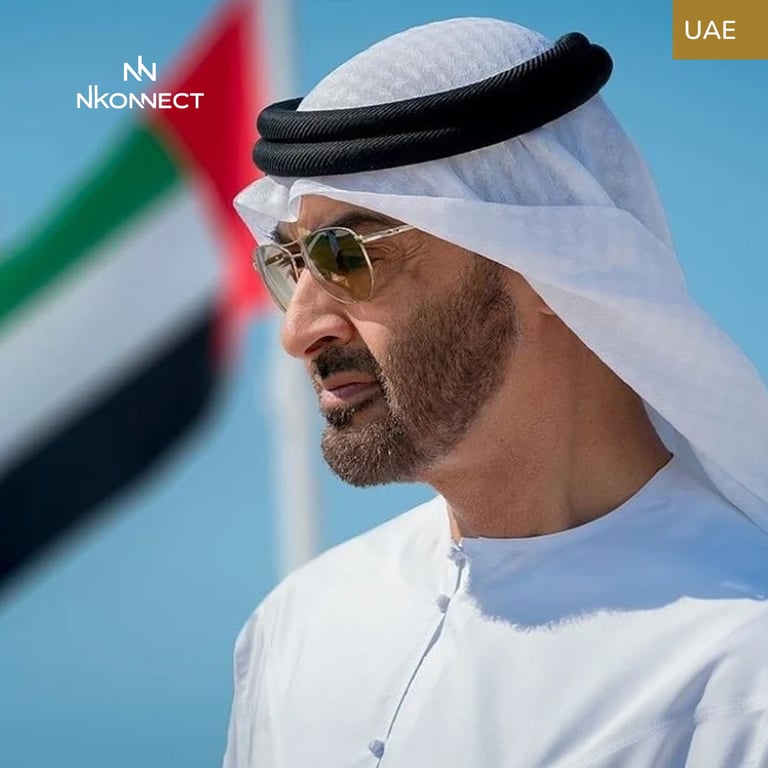Sheikh Mohamed bin Zayed Al Nahyan : Shaping the Future of the UAE
UAE


Sheikh Mohammed bin Zayed Al Nahyan, commonly known as MBZ or MbZ, stands as a pivotal figure in the landscape of Emirati leadership. His journey from education to military service and eventually to the helm of the UAE has been marked by strategic vision and unwavering commitment.
Early Life and Education Born on March 11, 1961, in Al Ain, Sheikh Mohammed's upbringing was steeped in a legacy of service and leadership. His education in Abu Dhabi and Al Ain laid the foundation for his later achievements. At the Royal Military Academy Sandhurst, he honed his skills and graduated with distinction in April 1979.
Military Career and Leadership Roles Entering the UAE Military, Sheikh Mohammed rose through the ranks, showcasing exceptional leadership qualities. His tenure as a pilot in the UAE Air Force and subsequent promotion to general in 2005 reflected his dedication and expertise. These experiences shaped his understanding of defense and security, crucial aspects of his later leadership.
Ascension to Leadership Following the footsteps of his father, Sheikh Zayed bin Sultan Al Nahyan, and his brother, Sheikh Khalifa, Sheikh Mohammed assumed significant roles in Abu Dhabi's leadership. His appointment as Crown Prince in 2004 marked a turning point, leading to his pivotal role as the de facto ruler of Abu Dhabi and eventual presidency of the UAE.
Economic and Social Reforms Under Sheikh Mohammed's leadership, the UAE witnessed a period of transformative reforms. Economic liberalization initiatives such as VAT introduction, corporate tax reforms, and bankruptcy laws underscored the country's commitment to a diversified and robust economy. Socially, advancements in personal and legal rights reflected a progressive approach to societal development.
Opposition to Extremism and Regional Engagement Sheikh Mohammed's firm stance against extremism, particularly Islamism and Iran-backed groups, shaped the UAE's regional engagement. Active participation in combating ISIS, involvement in the Saudi-led intervention in Yemen, and diplomatic initiatives like the Abraham Accords highlighted the country's strategic positioning under his leadership.
International Recognition and Influence The global community recognized Sheikh Mohammed's influence and leadership prowess. Accolades such as being named the most powerful Arab ruler by The New York Times and inclusion in Time magazine's 100 Most Influential People list underscored his impact on regional and global affairs.
Legacy and Continued Vision As Sheikh Mohammed bin Zayed Al Nahyan continues to lead the UAE, his legacy as a visionary leader committed to progress, innovation, and stability endures. His ongoing efforts to shape the UAE's future and navigate complex regional dynamics cement his position as a transformative leader in the Middle East.
Conclusion Sheikh Mohammed bin Zayed Al Nahyan's journey from education to military service and leadership reflects a remarkable trajectory of vision, determination, and strategic foresight. His contributions to economic diversification, social development, and regional stability have positioned the UAE as a dynamic and influential player on the global stage. As he continues to steer the country forward, his legacy as a transformative leader shaping the UAE's future remains indelible.
Sheikh Mohammed bin Zayed Al Nahyan
UAE leadership
Visionary leadership
Economic reforms
Social development
Regional engagement
Anti-extremism stance
International recognition
Middle East dynamics
Future of the UAE
Mohammed bin Zayed Road


